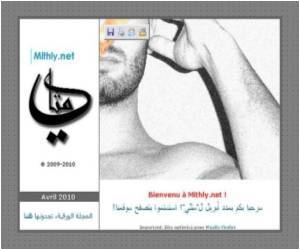By Western standards it's tame, with no nudity, no sex and mostly text. Yet a new gay Moroccan Internet magazine may test the limits in a country where homosexuality is taboo.

While gay and lesbian information websites already exist in Arabic, Samir Bargachi, one of Mithly's founding editors, told AFP it will be the first gay full-fledged monthly Internet magazine in Arabic.
"It's encouraging," he said after it went online this month. "Both Moroccans and foreigners have offered to write for our review and the letters page is already packed."
The site could test Morocco's bid to balance a move towards modernity and closer ties with Europe with the conservative religious and social values still embraced by many.
It hit the scene amid Islamic hardliners' outrage over the participation of British pop star Elton John, a homosexual, in a huge Rabat music festival starting this weekend.
The main opposition Islamist Justice and Development Party called -- unsuccessfully -- for authorities to ban the singer from taking part, saying his presence posed a "risk of encouraging homosexuality in Morocco".
Yet Mithly jumps right out of the closet. Its home page states, in English, that it's the "Moroccan Queer Magazine" and its logo, Arabic calligraphy for Mithly, is drawn in the unmistakable rainbow colors of the gay pride movement.
The "about us" chapter says the site wants to promote understanding about "what we aim for as a pressure group living in the most socially and politically turbulent area on the globe" so that "we may be recognised, accepted, included for who we truly are."
What they are up against is Morocco's penal code where Article 489 states -- as one official in the communications ministry who asked not to be named reminded -- that homosexual acts can be punished with "six months to three years imprisonment".
While there are no figures on convictions for this "crime", local papers still carry stories from time to time about people arrested on charges of homosexuality.
However, like liquor and wine consumption -- proscribed for Muslims under Moroccan law -- homosexuality is tolerated here provided practitioners do not flaunt their difference.
Mithly, for example, is quietly put together by a dozen collaborators in Rabat and Casablanca (www.mithly.net), according to Bargachi who is also coordinator of a homosexual rights association called Kif-Kif (the same).
Before it went online, however, Mithly "published a first number on paper to mark the occasion with a powerful symbolic act," said Bargachi.
More than 200 copies were grabbed up in a few days with "very positive responses from homosexuals and from certain heterosexuals," he said.
Others are more cautious.
"In Morocco, there are provisions to punish outrage against public morals," said Rabat barrister Mourad Bekkouri. "In the case of this review, those responsible risk running up against the law."
The communications ministry official, meanwhile, declined comment on the site but stressed that Morocco has a "constitution which considers Islam to be the religion of the state ... and Islam, like other religions, disapproves of homosexual practices."
Yet change is afoot.
Kif-Kif, for example, held without incident -- and for the third year -- a series of debates, a documentary and even a party with a drag queen last weekend for International Day Against Homophobia, marked around the globe on May 17.
And festival organisers refused to bend to the Islamists' request to ban Elton John from the ninth annual Mawazine festival, which runs May 21 to 29 and features a host of regional and international names including Sting, Carlos Santana, Julio Iglesias and BB King.
"At the Mawazine festival we invite artists based on the quality of their performance on stage and their artistic career," said one of the festival's directors Aziz Daki.
"We cannot withdraw an artist because of his homosexuality, which would be a violation of his right to privacy and compromise the values behind the festival," he said.
"Morocco is a tolerant Muslim country. The participation by Elton John illustrates that," said a Moroccan official on condition on anonymity. "Homosexuality is a universal practice."
Source-AFP
SRM








